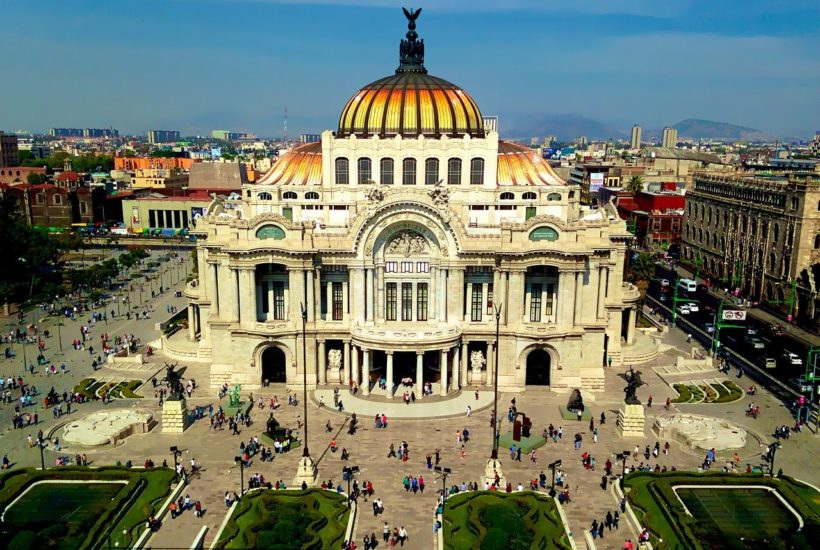Cannabis
What impact will cannabis legalization in Mexico have on drug cartels?
According to the RIA Institute, which investigates drug policy in Mexico, cannabis production in this country ranges between 15,000 and 27,000 tons per year. The cultivation area is about 114,000 hectares, 72% of which is located in the region known as the Golden Triangle, located between the states of Sinaloa, Chihuahua and Durango, an area practically dominated by the Sinaloa Cartel.

One of the main motivations for the legalization of cannabis in Mexico is to combat drug trafficking, but experts doubt its impact as cannabis is no longer the major source of income for the cartels.
The Chamber of Deputies approved this week the legislation that legalizes the recreational use of cannabis to comply with a mandate of the Supreme Court that declared its prohibition unconstitutional, and now only the vote of the Senate is missing.
During Wednesday’s debate, Congressman Arturo Hernández, of the ruling National Regeneration Movement (Morena), defended the legalization, arguing that the military war against drug trafficking initiated by Felipe Calderón (2006-2012) “caused more havoc than the health effects” of drugs.
Read more on the subject and find the latest cannabis news in the world with the Hemp.im mobile app.
Reduction in narco-violence
In 2020, despite the confinement caused by the COVID-19 pandemic, Mexico recorded 34,515 victims of intentional homicide, almost equaling the all-time record of 34,582 murders in 2019.
According to the NGO Semáforo Delictivo, 80% of the homicides registered each year in the country are attributable to organized crime, confrontations, and settling of scores.
For this reason, the organization’s director, Santiago Roel, has no doubt that “the legalization of cannabis and other black market drugs in Mexico can contribute to the reduction of violence.”
“The only way to combat this violence is through economic principles and not with bullets,” Roel told Efe on Sunday, who believes that regularization will take the market away from the drug cartels.
The new Federal Law for the Regulation of Cannabis and the reforms to the General Health Law and the Penal Code discussed in Congress foresee the extension of the permitted possession of marijuana up to 28 grams, the cultivation of eight plants at home and permits for the cultivation and sale of cannabis for recreational purposes.
Mexico will thus join Uruguay, Canada and some U.S. states that have legalized cannabis.
The director of Semáforo Delictivo considered that this regulation comes “late”, since Mexico should have been a “pioneer” in the world due to the violence it suffered, and called for poppy cultivation to follow the same path.
Although he admitted that the United States, the world’s largest consumer of drugs, has traditionally used Mexico as a “scapegoat”, blaming it for the sale of narcotics and pressuring it not to regulate drugs.
According to the RIA Institute, which investigates drug policy in Mexico, cannabis production in this country ranges between 15,000 and 27,000 tons per year.
The cultivation area is about 114,000 hectares, 72% of which is located in the region known as the Golden Triangle, located between the states of Sinaloa, Chihuahua and Durango, an area practically dominated by the Sinaloa Cartel.
Researcher Falko Ernst, of the Crisis Group organization, told Efe that regularization is positive because it could empty the prisons of consumers and small-scale dealers.
However, he expressed that “there are doubts about the reduction of violence levels because marijuana for most cartels is no longer as relevant as other drugs.”
A study by the Mexican Senate estimated in 2016 that Mexican cartels received between 1 and 2 billion dollars annually from the sale of marijuana in the United States and calculated losses of between 15% and 26% of their total income if Mexico were legalized.
In addition, he foresaw “economic damage to the cartels, particularly the Sinaloa cartel” due to a lower demand for the Mexican plant because of the expansion of legal production in the United States.
This is already beginning to be a reality, according to the US Drug Enforcement Administration (DEA) in its 2020 National Drug Threat Assessment report.
Although it still considers Mexico as “the largest source of cannabis supply in the United States,” it noted that its presence is decreasing, from 287,000 kilos in 2018 to 249,000 kilos in 2019.
In contrast, he highlights the “large quantities” of fentanyl, heroin, methamphetamines and cocaine distributed by the Jalisco Cartel – New Generation (CJNG) and the Sinaloa Cartel in the United States.
For this reason, Ernst stressed that the “survival” of the cartels does not depend on marijuana, in addition to the fact that they have great capacity to “extort” farmers who opt for the legal way of planting. “There is a great risk if legalization is not accompanied by security strategies,” he concluded.
__
(Featured image by victormattei via Pixabay)
DISCLAIMER: This article was written by a third party contributor and does not reflect the opinion of Born2Invest, its management, staff or its associates. Please review our disclaimer for more information.
This article may include forward-looking statements. These forward-looking statements generally are identified by the words “believe,” “project,” “estimate,” “become,” “plan,” “will,” and similar expressions. These forward-looking statements involve known and unknown risks as well as uncertainties, including those discussed in the following cautionary statements and elsewhere in this article and on this site. Although the Company may believe that its expectations are based on reasonable assumptions, the actual results that the Company may achieve may differ materially from any forward-looking statements, which reflect the opinions of the management of the Company only as of the date hereof. Additionally, please make sure to read these important disclosures.
First published in infobae, a third-party contributor translated and adapted the article from the original. In case of discrepancy, the original will prevail.
Although we made reasonable efforts to provide accurate translations, some parts may be incorrect. Born2Invest assumes no responsibility for errors, omissions or ambiguities in the translations provided on this website. Any person or entity relying on translated content does so at their own risk. Born2Invest is not responsible for losses caused by such reliance on the accuracy or reliability of translated information. If you wish to report an error or inaccuracy in the translation, we encourage you to contact us.

-

 Cannabis2 weeks ago
Cannabis2 weeks agoIs Aurora Cannabis Stock a Risk Worth Taking?
-

 Fintech1 week ago
Fintech1 week agoRobinhood Expands to Europe with Tokenized Stocks and Perpetual Futures
-

 Business2 weeks ago
Business2 weeks agoAmerica’s Debt Spiral: A $67 Trillion Reckoning Looms by 2035
-

 Markets2 days ago
Markets2 days agoThe Big Beautiful Bill: Market Highs Mask Debt and Divergence

























